Overview
- Brief Narrative
- Tallit, or prayer shawl with embroidered insignia worn by Rabbi Judah Nadich for his work as a Jewish chaplain in the United States Army from 1942-1946. Designed per US Army regulations, the tallit has the US coat of arms above the Jewish chaplain's insignia: a Star of David and the tablets of law. Nadich arrived in Paris just after its liberation on August 24, 1944. He conducted the first religious service after liberation in the rue de la Victoire synagogue, and preached to the assembled congregation of Jewish GIs and survivors in both French and English. On Passover 1945, Nadich conducted seders for 6000 Jewish troops in a Champs d’Elysee night club. In August 1945, Lt. Colonel Nadich, Senior Jewish Chaplain, European Theater, was stationed at Supreme Headquarters, Allied Expeditionary Forces, as the first Advisor on Jewish Affairs to General Eisenhower. He investigated the conditions of Jewish refugees at displaced persons camps. He found the living conditions horrifying and helped develop improvements. Nadich also convinced Eisenhower to reconsider the Allied policy of not admitting refugees from Eastern Europe, explaining how unthinkable it was for survivors to return to homelands where their entire families had been murdered.
- Date
-
use:
1942-1946
- Credit Line
- United States Holocaust Memorial Museum Collection, Gift of the Estates of Judah Nadich and Martha Hadassah Nadich
- Contributor
-
Subject:
Judah Nadich
- Biography
-
Judah Nadich was born in Baltimore, Maryland, on May 13, 1912. He was the oldest of four children of Isaac and Lena Nathanson Nadich, who had emigrated from Russia in the early 1900s. Isaac owned a neighborhood grocery store and was a socialist and member of the Workmen's Circle. Nadich's mother Lena died in 1919, and he was raised by his stepmother Nettie Gifter Nadich, an immigrant from Lithuania. Nadich was awarded a scholarship to study at the Yeshiva high school in New York City, and he then attended Yeshiva College, City College of New York, and Johns Hopkins University. Upon completion of his undergraduate studies, he enrolled in the rabbinical school of the Jewish Theological Seminary of America and in a master's program in history at Columbia University. In 1936, he received his rabbinical ordination and his masters degree, and later earned a doctorate in Hebrew literature from the Jewish Theological Seminary. Between 1936 and early 1942, Rabbi Nadich served as a rabbi at Conservative synagogues in Buffalo, New York, and Chicago, Illinois.
Shortly after the Japanese bombing of Pearl Harbor on December 7, 1941, Nadich enlisted in the US Army as a chaplain. At the end of summer 1942, he was sent to Great Britain as the first Jewish chaplain in the European Theater of Operations. For the next two years, he was stationed in Northern Ireland and England. He was responsible for serving the religious needs of Jewish soldiers and officers and for training and assigning duties to new Jewish chaplains as they arrived in the United Kingdom. In 1944, Nadich was sent to France, where he was put in charge of procurement for all religious purposes. When Allies Forces marched into liberated Paris at the end of August, Nadich followed close behind. He sought out the Jewish community, driving his jeep with his Jewish chaplain's insignia, and a crowd soon gathered. Most had survived the war in hiding and he was the survivors' first contact with the outside Jewish world. They gave him a batch of the yellow star badges that Jews in France had been forced to wear as a mark of humiliation by the German occupation authorities. Nadich helped the new Jewish leadership open a public kitchen, establish a free loan society, and make contact with relatives in the US. When the first religious service after the liberation was held at the rue de la Victoire synagogue, Rabbi Nadich preached to the assembled congregation of Jewish GIs and survivors in both French and English. On Passover 1945, Rabbi Nadich conducted seders for 6,000 Jewish troops in a Champs d’Elysee night club. In Paris, and later in Germany, Nadich provided help to the Bricha organization in its efforts to assist Jewish refugees to emigrate, often illegally, by ship to Palestine. On several occasions, he secured supplies to help sustain the displaced population as they waited for transport to Palestine.
In August 1945, Nadich was transferred to Frankfurt, Germany. Lieutenant Colonel Nadich was appointed to the new post of Advisor on Jewish Affairs to the commander of US forces in Europe, General Dwight Eisenhower. The position was created due to the Harrison Report condemning the army for its treatment of Jewish displaced persons. Nadich was sent by Eisenhower to visit DP camps in the American zone of Germany, report on conditions, and make recommendations for their improvement. In a book he wrote in 1953, Eisenhower and the Jews, Nadich described the horrific conditions he found in the displaced persons camps, with forty survivors crammed into rooms built to hold 6, in leaky barracks with no insulation. Food shortages were common and people were not permitted to leave the camps, which were fenced with barbed wire just like the concentration camps. After a three month tour, his recommendations included the placement of Jews into separate camps, improvements in nutrition, the easing of travel restrictions, the removal of camp fences, and the organization of Jewish committees. During the fall of 1945, Nadich toured DP camps in Austria and met with representatives of Bergen-Belsen DP camp in the British zone of occupation. In October, he accompanied Jewish Agency chairman, David Ben-Gurion, on a tour of Zeilsheim DP camp, his first visit to a displaced persons camp, which Nadich had convinced Eisenhower to grant. The Allies had a policy to return survivors to their native countries. Nadich explained to Eisenhower that this was unthinkable to those whose entire families had been murdered in those homelands. On August 22, 1945, Eisenhower issued an order that altered American policy regarding the displaced Jewish population. Nadich further advised Eisenhower to permit Jewish refugees from Eastern Europe who managed to cross into the American zone to remain in the Jewish DP camps, a population which surged in the fall of 1945.
In November 1945, the post of advisor on Jewish affairs was assigned to a civilian appointed by President Truman, Judge Simon H. Rifkind. Nadich returned to the US. For the next year and a half, he worked for the Joint Distribution Committee and the United Jewish Appeal. In 1947, he married Martha Hadassah Ribalow and the couple had three daughters. He wrote a book, Eisenhower and the Jews, published in 1953, drawing on his wartime experiences. Nadich resumed his rabbinical career. He served as the rabbi of Congregation Kehillath Israel in Brookline, MA, for ten years. He then became rabbi at the Park Avenue Synagogue in Manhattan for thirty years, until his retirement in 1987. He was an advocate for civil rights and an end to segregation. In May 1974, when he was president of the Rabbinical Assembly, the international association of Conservative rabbis, Nadich encouraged the group to consider the ordination of women, which occurred in 1985. At Park Avenue Synagogue, he included women in the minyan and called women to the torah to recite the blessings for Sabbath morning services. Rabbi Nadich, age 95, died in Manhattan on August 26, 2007.
Physical Details
- Classification
-
Jewish Art and Symbolism
- Category
-
Jewish ceremonial objects
- Object Type
-
Tallitot (Jewish liturgical objects) (lcsh)
- Physical Description
- Long, narrow, rectangular scarf made from 2 panels of textured offwhite taffeta weave silk with a golden sheen. Each panel is folded in half, with a vertical back seam. The 2 panels are sewn together at 1 short end. Each end of the tallit has machine embroidered insignia in gold thread: a 3 in. Great Seal of the US, an eagle with an olive branch in its left talons and arrows in its right; below this, a 4 in. Jewish Chaplain's insignia: a Star of David, and a patch of the 10 Commandments: 2 tablets of law with Roman numerals 1-5 on the right and 6-10 on the left, a 6 inch margin, with a band of 5 inch golden brown fringe trim sewn to the end. A tzitzit, a golden white knotted tassel, is inserted through a finished hole in each corner, which is reinforced on the back with a square of the tallit cloth.
- Dimensions
- overall: Height: 70.000 inches (177.8 cm) | Width: 8.875 inches (22.543 cm)
- Materials
- overall : silk, thread
Rights & Restrictions
- Conditions on Access
- No restrictions on access
- Conditions on Use
- No restrictions on use
Keywords & Subjects
Administrative Notes
- Legal Status
- Permanent Collection
- Provenance
- The tallit was donated to the United States Holocaust Memorial Museum by the Estates of Judah Nadich and Martha Hadassah Nadich.
- Funding Note
- The cataloging of this artifact has been supported by a grant from the Conference on Jewish Material Claims Against Germany.
- Record last modified:
- 2022-10-17 09:07:36
- This page:
- https://collections.ushmm.org/search/catalog/irn45308
Download & Licensing
In-Person Research
- By Appointment
- Request 21 Days in Advance of Visit
- Plan a Research Visit
- Request to See This Object
Contact Us
Also in Rabbi Judah Nadich collection
The collection consists of diaries, planners, publications, correspondence, statistical charts, seven unused Star of David badges, a Waffen SS addressed envelope, and a US Army's Chaplain tallit relating to the experiences of Rabbi Judah Nadich as a chaplain in the United States Army in Paris, France, following the liberation of the city by US forces in August 1944, as the first advisor on Jewish Affairs to General Eisenhower, Supreme Headquarters, Allied Expeditionary Forces, and his post-war work with WWII and Holocaust commemoration.
Date: 1944 August-1945
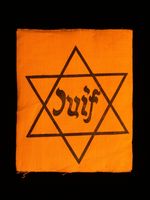
Unused Star of David badge with Juif acquired by a Jewish chaplain, US Army
Object
Cloth rectangle with a Star of David badge imprinted Juif given to Rabbi Judah Nadich in Paris after liberation. Seeking out surviving members of the Jewish community, Nadich drove his jeep with his Jewish chaplain's insignia into the prewar Jewish neighborhood and soon a crowd gathered. Most had survived the war in hiding and Nadich was their first contact with the outside Jewish world. They gave him a batch of the yellow star badges that Jews in France had been forced to wear as a mark of humiliation from March 27, 1942. See 1988.39.2-3, 1990.54.1-4, and 1994.a.0250.2 for 7 other badges he received. Nadich, a Jewish chaplain in the US Army from 1942-1946, arrived in Paris just after liberation on August 24, 1944. In August 1945, Lt. Colonel Nadich, Senior Jewish Chaplain, European Theater, was stationed at Supreme Headquarters, Allied Expeditionary Forces, as the first Advisor on Jewish Affairs to General Eisenhower. He was assigned to investigate conditions of Jewish refugees at displaced persons camps in the American occupation zone. Nadich found conditions horrifying with severe overcrowding, insufficient food, and barbed wire enclosed camps that residents were not permitted to leave. In addition to improvements in conditions, Nadich convinced Eisenhower to reconsider the Allied policy of sending refugees back to their native countries, explaining how unthinkable that was for survivors whose entire families had been murdered in those homelands.
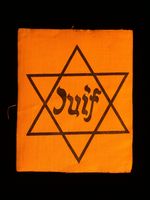
Unused Star of David badge with Juif acquired by a Jewish chaplain, US Army
Object
Cloth rectangle with a Star of David badge imprinted Juif given to Rabbi Judah Nadich in Paris after liberation. Seeking out surviving members of the Jewish community, Nadich drove his jeep with his Jewish chaplain's insignia into the prewar Jewish neighborhood and soon a crowd gathered. Most had survived the war in hiding and Nadich was their first contact with the outside Jewish world. They gave him a batch of the yellow star badges that Jews in France had been forced to wear as a mark of humiliation from March 27, 1942. See 1988.39.1& 3, 1990.54.1-4, and 1994.a.0250.2 for 7 other badges he received. Nadich, a Jewish chaplain in the US Army from 1942-1946, arrived in Paris just after liberation on August 24, 1944. In August 1945, Lt. Colonel Nadich, Senior Jewish Chaplain, European Theater, was stationed at Supreme Headquarters, Allied Expeditionary Forces, as the first Advisor on Jewish Affairs to General Eisenhower. He was assigned to investigate conditions of Jewish refugees at displaced persons camps in the American occupation zone. Nadich found conditions horrifying with severe overcrowding, insufficient food, and barbed wire enclosed camps that residents were not permitted to leave. In addition to improvements in conditions, Nadich convinced Eisenhower to reconsider the Allied policy of sending refugees back to their native countries, explaining how unthinkable that was for survivors whose entire families had been murdered in those homelands.
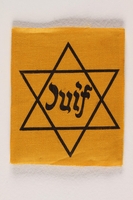
Unused Star of David badge with Juif acquired by a Jewish chaplain, US Army
Object
Cloth rectangle with a Star of David badge imprinted Juif given to Rabbi Judah Nadich in Paris after liberation. Seeking out surviving members of the Jewish community, Nadich drove his jeep with his Jewish chaplain's insignia into the prewar Jewish neighborhood and soon a crowd gathered. Most had survived the war in hiding and Nadich was their first contact with the outside Jewish world. They gave him a batch of the yellow star badges that Jews in France had been forced to wear as a mark of humiliation from March 27, 1942. See 1988.39.1& 2, 1990.54.1-4, and 1994.a.0250.2 for 7 other badges he received. Nadich, a Jewish chaplain in the US Army from 1942-1946, arrived in Paris just after liberation on August 24, 1944. In August 1945, Lt. Colonel Nadich, Senior Jewish Chaplain, European Theater, was stationed at Supreme Headquarters, Allied Expeditionary Forces, as the first Advisor on Jewish Affairs to General Eisenhower. He was assigned to investigate conditions of Jewish refugees at displaced persons camps in the American occupation zone. Nadich found conditions horrifying with severe overcrowding, insufficient food, and barbed wire enclosed camps that residents were not permitted to leave. In addition to improvements in conditions, Nadich convinced Eisenhower to reconsider the Allied policy of sending refugees back to their native countries, explaining how unthinkable that was for survivors whose entire families had been murdered in those homelands.
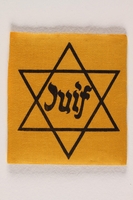
Unused Star of David badge with Juif acquired by a Jewish chaplain, US Army
Object
Cloth rectangle with a Star of David badge imprinted Juif given to Rabbi Judah Nadich in Paris after liberation. Seeking out surviving members of the Jewish community, Nadich drove his jeep with his Jewish chaplain's insignia into the prewar Jewish neighborhood and soon a crowd gathered. Most had survived the war in hiding and Nadich was their first contact with the outside Jewish world. They gave him a batch of the yellow star badges that Jews in France had been forced to wear as a mark of humiliation from March 27, 1942. See 1988.39.1-3, 1990.54.2-4, and 1994.a.0250.2 for 7 other badges he received. Nadich, a Jewish chaplain in the US Army from 1942-1946, arrived in Paris just after liberation on August 24, 1944. In August 1945, Lt. Colonel Nadich, Senior Jewish Chaplain, European Theater, was stationed at Supreme Headquarters, Allied Expeditionary Forces, as the first Advisor on Jewish Affairs to General Eisenhower. He was assigned to investigate conditions of Jewish refugees at displaced persons camps in the American occupation zone. Nadich found conditions horrifying with severe overcrowding, insufficient food, and barbed wire enclosed camps that residents were not permitted to leave. In addition to improvements in conditions, Nadich convinced Eisenhower to reconsider the Allied policy of sending refugees back to their native countries, explaining how unthinkable that was for survivors whose entire families had been murdered in those homelands.
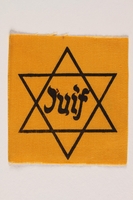
Unused Star of David badge with Juif acquired by a Jewish chaplain, US Army
Object
Cloth rectangle with a Star of David badge imprinted Juif given to Rabbi Judah Nadich in Paris after liberation. Seeking out surviving members of the Jewish community, Nadich drove his jeep with his Jewish chaplain's insignia into the prewar Jewish neighborhood and soon a crowd gathered. Most had survived the war in hiding and Nadich was their first contact with the outside Jewish world. They gave him a batch of the yellow star badges that Jews in France had been forced to wear as a mark of humiliation from March 27, 1942. See 1988.39.1& 3, 1990.54.1, 3-4, and 1994.a.0250.2 for 7 other badges he received. Nadich, a Jewish chaplain in the US Army from 1942-1946, arrived in Paris just after liberation on August 24, 1944. In August 1945, Lt. Colonel Nadich, Senior Jewish Chaplain, European Theater, was stationed at Supreme Headquarters, Allied Expeditionary Forces, as the first Advisor on Jewish Affairs to General Eisenhower. He was assigned to investigate conditions of Jewish refugees at displaced persons camps in the American occupation zone. Nadich found conditions horrifying with severe overcrowding, insufficient food, and barbed wire enclosed camps that residents were not permitted to leave. In addition to improvements in conditions, Nadich convinced Eisenhower to reconsider the Allied policy of sending refugees back to their native countries, explaining how unthinkable that was for survivors whose entire families had been murdered in those homelands.
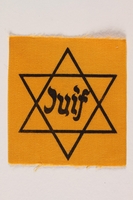
Unused Star of David badge with Juif acquired by a Jewish chaplain, US Army
Object
Cloth rectangle with a Star of David badge imprinted Juif given to Rabbi Judah Nadich in Paris after liberation. Seeking out surviving members of the Jewish community, Nadich drove his jeep with his Jewish chaplain's insignia into the prewar Jewish neighborhood and soon a crowd gathered. Most had survived the war in hiding and Nadich was their first contact with the outside Jewish world. They gave him a batch of the yellow star badges that Jews in France had been forced to wear as a mark of humiliation from March 27, 1942. See 1988.39.1& 3, 1990.54.1-3, and 1994.a.0250.2 for 7 other badges he received. Nadich, a Jewish chaplain in the US Army from 1942-1946, arrived in Paris just after liberation on August 24, 1944. In August 1945, Lt. Colonel Nadich, Senior Jewish Chaplain, European Theater, was stationed at Supreme Headquarters, Allied Expeditionary Forces, as the first Advisor on Jewish Affairs to General Eisenhower. He was assigned to investigate conditions of Jewish refugees at displaced persons camps in the American occupation zone. Nadich found conditions horrifying with severe overcrowding, insufficient food, and barbed wire enclosed camps that residents were not permitted to leave. In addition to improvements in conditions, Nadich convinced Eisenhower to reconsider the Allied policy of sending refugees back to their native countries, explaining how unthinkable that was for survivors whose entire families had been murdered in those homelands.
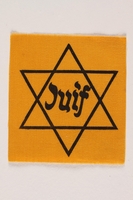
Unused Star of David badge with Juif acquired by a Jewish chaplain, US Army
Object
Cloth rectangle with a Star of David badge imprinted Juif given to Rabbi Judah Nadich in Paris after liberation. Seeking out surviving members of the Jewish community, Nadich drove his jeep with his Jewish chaplain's insignia into the prewar Jewish neighborhood and soon a crowd gathered. Most had survived the war in hiding and Nadich was their first contact with the outside Jewish world. They gave him a batch of the yellow star badges that Jews in France had been forced to wear as a mark of humiliation from March 27, 1942. See 1988.39.1& 3, 1990.54.1-3, and 1994.a.0250.2 for 7 other badges he received. Nadich, a Jewish chaplain in the US Army from 1942-1946, arrived in Paris just after liberation on August 24, 1944. In August 1945, Lt. Colonel Nadich, Senior Jewish Chaplain, European Theater, was stationed at Supreme Headquarters, Allied Expeditionary Forces, as the first Advisor on Jewish Affairs to General Eisenhower. He was assigned to investigate conditions of Jewish refugees at displaced persons camps in the American occupation zone. Nadich found conditions horrifying with severe overcrowding, insufficient food, and barbed wire enclosed camps that residents were not permitted to leave. In addition to improvements in conditions, Nadich convinced Eisenhower to reconsider the Allied policy of sending refugees back to their native countries, explaining how unthinkable that was for survivors whose entire families had been murdered in those homelands.
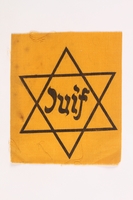
Unused Star of David badge with Juif acquired by a Jewish chaplain, US Army
Object
Cloth rectangle with a Star of David badge imprinted Juif given to Rabbi Judah Nadich in Paris after liberation. Seeking out surviving members of the Jewish community, Nadich drove his jeep with his Jewish chaplain's insignia into the prewar Jewish neighborhood and soon a crowd gathered. Most had survived the war in hiding and Nadich was their first contact with the outside Jewish world. They gave him a batch of the yellow star badges that Jews in France had been forced to wear as a mark of humiliation from March 27, 1942. See 1988.39.1-3 and 1990.54.1-4 for 7 other badges he received. Nadich, a Jewish chaplain in the US Army from 1942-1946, arrived in Paris just after liberation on August 24, 1944. In August 1945, Lt. Colonel Nadich, Senior Jewish Chaplain, European Theater, was stationed at Supreme Headquarters, Allied Expeditionary Forces, as the first Advisor on Jewish Affairs to General Eisenhower. He was assigned to investigate conditions of Jewish refugees at displaced persons camps in the American occupation zone. Nadich found conditions horrifying with severe overcrowding, insufficient food, and barbed wire enclosed camps that residents were not permitted to leave. In addition to improvements in conditions, Nadich convinced Eisenhower to reconsider the Allied policy of sending refugees back to their native countries, explaining how unthinkable that was for survivors whose entire families had been murdered in those homelands.
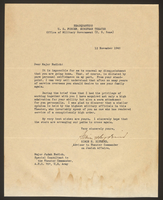
Rabbi Judah Nadich papers
Document
The Rabbi Judah Nadich papers consist of material related to Rabbi Nadich’s work as a Jewish chaplain in the United States Army from 1942-1945, and his work as the Senior Jewish Chaplain at SHAEF from 1945-1946 reporting to General Dwight D. Eisenhower on the conditions in former concentration camps and in displaced persons camps. Includes Rabbi Nadich’s wartime and post-war diaries and planners; publications given to Jewish soldiers; correspondence; statistical charts relating to Jewish displaced persons in postwar Germany and Austria; and information regarding Rabbi Nadich’s post-war work regarding World War II and Holocaust commemoration.
Envelope with a Waffen SS return address found by a Jewish chaplain postwar at Buchenwald
Object
Unused envelope stamped with a Waffen SS Konzentrationslager Buchenwald return address found by Rabbi Judah Nadich during a visit to the former Buchenwald concentration camp in 1945. Buchenwald was established in 1937 near Weimar, Germany, with 88 subcamps. It supplied forced labor for SS administered German Equipment Works, the camp stone quarry, and local munitions factories. The camp was liberated by US troops on April 11, 1945. Nadich was a Jewish chaplain in the US Army from 1942-1946. He arrived in Paris just after its liberation on August 24, 1944. In August 1945, Lt. Colonel Nadich, Senior Jewish Chaplain, European Theater, was stationed at Supreme Headquarters, Allied Expeditionary Forces, as the first Advisor on Jewish Affairs to General Eisenhower. He was assigned to investigate the conditions of Jewish refugees at displaced persons camps in the American occupation zone in Germany. Nadich found the conditions horrifying with severe overcrowding, insufficient food, and barbed wire enclosed camps that residents were not permitted to leave. In addition to improvements in living conditions, Nadich also convinced Eisenhower to reconsider the Allied policy of sending refugees back to their native countries, explaining how unthinkable that was for survivors whose entire families had been murdered in those homelands.



